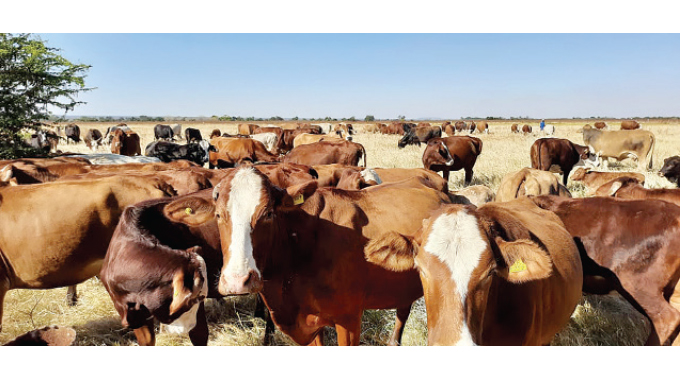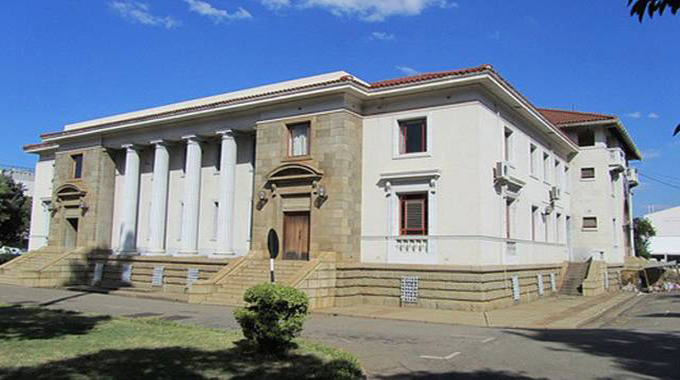Agriculture tourism at BCC farm

Mashudu Netsianda, Senior Reporter
BULAWAYO City Council (BCC) has adopted an enviable integrated farming model at its farms in Umguza District on the city’s outskirts by utilising reclaimed water from its sewage treatment plant to support a thriving farming venture.
The integrated farming activities at Aisleby and Goodhope farms that are adjacent to each other and are within one fence, are part of the local authority’s income-generating projects through its strategic business units (SBUs).
The farms are mainly involved in production of cereal crops and livestock production.
There is 100 hectares of arable land which is being utilised for the production of sorghum.

The sorghum is then sold to Ingwebu Breweries, which uses it to make traditional beer and various flavours of amahewu.
Livestock production includes Boer goat breeding and cattle ranching.
The farm is home to a herd of 543 cattle whose maternal line is the Hereford or its related cross-breeds while the sire lines (bulls) are Brahman, Hereford and the Beefmaster and 250 Boer goats and horses, which are used for security patrols.

BCC economic development officer, Mr Kholisani Moyo
BCC economic development officer, Mr Kholisani Moyo said beef production is one of their major activities at the farm with a total of 970 hectares having been set aside for grazing.
“The grazing area is under irrigated pastures which have kikuyu and star grass, these are able to sustain intense defoliation or grazing leading to a higher carrying capacity of 2 500 head being attained,” he said.
Mr Moyo said the main objective of setting up the farm was to utilise the sewage and water through agricultural activities.
“We are utilising reclaimed water from our sewage treatment plants.
This is based on the need to productively use large volumes of water and sewage produced by our sewage treatment plants,” he said.
The reclaimed water is used for crop irrigation while the sludge is spread on the field and incorporated into the soil to improve crop fertility.
The area set aside for cropping is 317 hectares.
“The white maize is for grain which we supply to the Grain Marketing Board and while the red sorghum is produced specifically for beer and amahewu brewing and we supply to our sister company, Ingwebu Breweries,” said Mr Moyo.
In terms of beef production, Mr Moyo said the breeding programme is designed in such a way that all steers are sold at the age of two years as pen fed supers.
“All excess heifers are sold and our farm is well known for supplying high quality breeding stock to farmers in the region. We also supply quality beef in high grades to the market,” he said.
“As a result, all our animals that we sell for slaughter are finished in the pen or in the pastures to achieve desired grades at competitive prices.”
Mr Moyo said they are currently maintaining a herd of over 500 cattle although they have capacity to hold 2500 head of cattle.
“We have actually limited the numbers to avoid overgrazing of the area because of inadequate recycled water from our sewer treatment plant.
However, once we get enough water for our pastures, we will be able to increase numbers,” he said
Mr Moyo said they sell the animals through auctions to finance their farming activities.
“We have also introduced a goat breeding project having started with 100 and the number has increased to 254.

Our intention is to have Boer goats and therefore we are crossing them with the indigenous Matabele breed and so far, we have reached 50 percent in terms of Boer goats,” he said.
“We sell some of the male cross-breeds to the public and keep female ones for breeding purposes.”
Mr Moyo said they have also introduced agriculture tourism and under this model, council is using the farm to attract tourists.
“To support this project, we have already acquired horses, which we are training so that we can take visitors around the farm so that they are able to sample all the activities at the farm,” he said.
Aisleby and Goodhope farms employ 40 workers with the numbers increasing depending on the season.
Mr Moyo said demand for their animals is very high with some of their clients coming from as far as Harare.
Recently the council sold 20 cattle to Harare City Council.

Harare City Council
“Our clientele cuts across the whole country.
We are also growing sugar beans and this year we planted 10 hectares of sugar beans, which were, however, affected by drought.
We are hoping that we will soon participate in various Government funded schemes,” he said.
“We have a challenge when it comes to equipment such as machinery and currently, we even hire trucks to transport our produce.
We also get manure from our livestock and integrate the use of organic and inorganic fertilisers as part of the value chain and sell to farmers including hay bales.”
Mr Moyo said since they sell their cattle on a quarterly basis, they are also supporting the beef and leather industries.
“If you buy our animals their skin quality is good because we don’t use them for draught power but specifically for slaughter.
When this farming project was introduced, the idea was to deal with the proper disposal of recycled water,” he said.
“Instead of letting the recycled water flow into the streams, we decided to put it to good use by watering pastures and crops.
Most of the water which is supposed to be going to the treatment plant is lost along the way and once this issue is addressed, we will get more water and introduce lucerne production.”–@mashnets










Comments